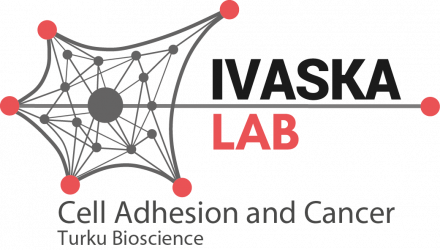No abstract…
Vimentin-ERK Signaling Uncouples Slug Gene Regulatory Function by Reetta Virtakoivu et al.
Epithelial-mesenchymal transition (EMT) in cells is a developmental process adopted during tumorigenesis that promotes metastatic capacity. In this study, we advance understanding of EMT control in cancer cells with the description of a novel vimentin-ERK axis that regulates the transcriptional…
Blocking integrin inactivation as an anti-angiogenic therapy by Pipsa Saharinen et al.
During angiogenesis, endothelial cell migration is coordinated by integrin-mediated contact with the extra-cellular matrix (ECM), coupled with receptor tyrosine kinase signalling to regulate dynamic cytoskeletal and plasma membrane reorganization. A recent paper by Vitorino et al (2015) defined a new…
Johanna Ivaska: Finding opposing forces in integrins by Johanna Ivaska et al.
Ivaska has taken the road less traveled to show how integrin inactivation regulates cell migration and invasion.
Integrin traffic – the update by Nicola De Franceschi et al.
Integrins are a family of transmembrane cell surface molecules that constitute the principal adhesion receptors for the extracellular matrix (ECM) and are indispensable for the existence of multicellular organisms. In vertebrates, 24 different integrin heterodimers exist with differing substrate specificity…
Endothelial destabilization by angiopoietin-2 via integrin β1 activation by Laura Hakanpaa et al.
Angiopoietins regulate vascular homeostasis via the endothelial Tie receptor tyrosine kinases. Angiopoietin-1 (Ang1) supports endothelial stabilization via Tie2 activation. Angiopoietin-2 (Ang2) functions as a context-dependent Tie2 agonist/antagonist promoting pathological angiogenesis, vascular permeability and inflammation. Elucidating Ang2-dependent mechanisms of vascular destablization…
OSBP-related protein 3 (ORP3) coupling with VAMP-associated protein A regulates R-Ras activity by Marion Weber-Boyvat et al.
ORP3 is an R-Ras interacting oxysterol-binding protein homolog that regulates cell adhesion and is overexpressed in several cancers. We investigated here a novel function of ORP3 dependent on its targeting to both the endoplasmic reticulum (ER) and the plasma membrane…
Tensin-4-dependent MET stabilization is essential for survival and proliferation in carcinoma cells by Ghaffar Muharram et al.
Inappropriate MET tyrosine kinase receptor signaling is detected in almost all types of human cancer and contributes to malignant growth and MET dependency via proliferative and antiapoptotic activities. Independently, Tensin-4 (TNS4) is emerging as a putative oncogene in many cancer…
Distinct c-Met activation mechanisms induce cell rounding or invasion through pathways involving integrins, RhoA and HIP1 by Anja Mai et al.
Many carcinomas have acquired oncogenic mechanisms for activating c-Met, including c-Met overexpression and excessive autocrine or paracrine stimulation with hepatocyte growth factor (HGF). However, the biological outcome of c-Met activation through these distinct modes remains ambiguous. Here, we report that…
An RNAi screen identifies KIF15 as a novel regulator of the endocytic trafficking of integrin by Anastasia Eskova et al.
α2β1 integrin is one of the most important collagen-binding receptors, and it has been implicated in numerous thrombotic and immune diseases. α2β1 integrin is a potent tumour suppressor, and its downregulation is associated with increased metastasis and poor prognosis in…
